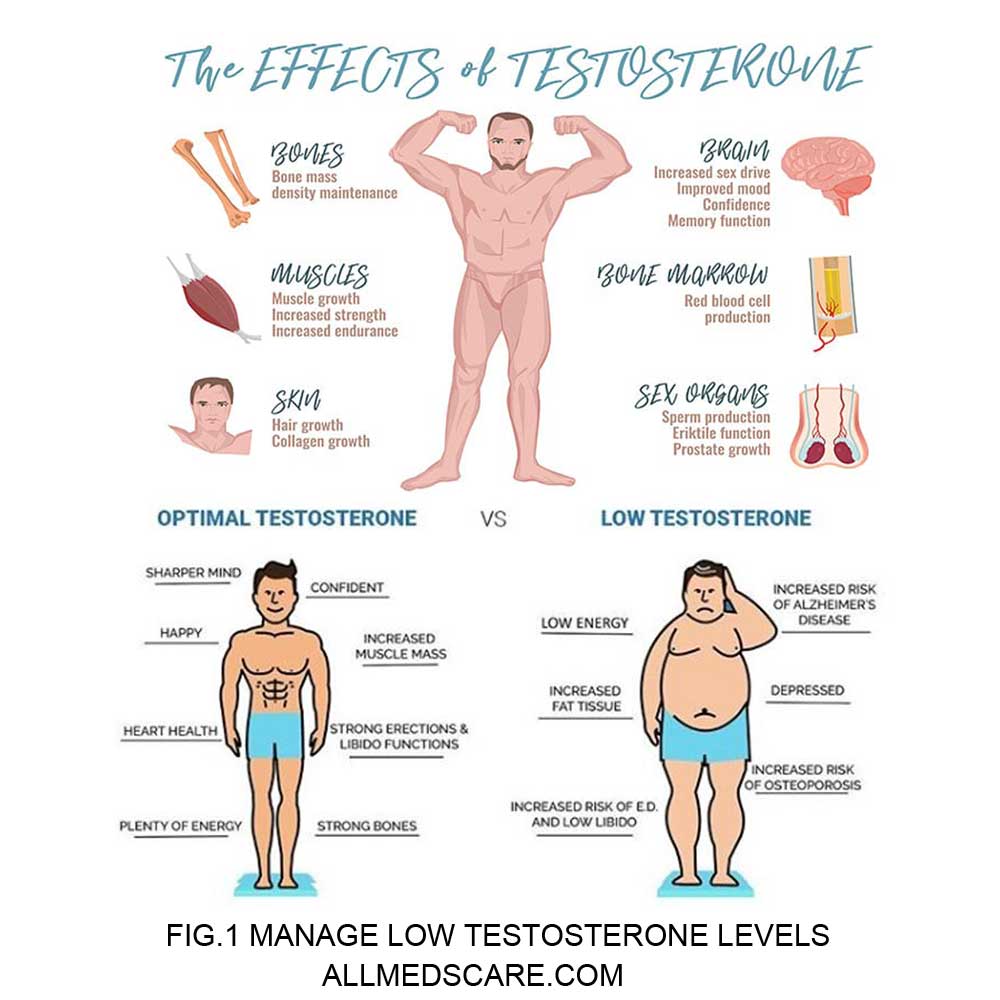
Tips to Manage low testosterone levels in Men!
To be able to Manage low testosterone levels is really important for healthy sexual life. According to study results of the American Urological Association conference, near about 10-40 % of adult men in the USA have experienced testosterone deficiency. In male health, testosterone is a hormone that plays a vital role. It is the main key to developing male sexual characteristics including deep voice, muscle mass, and facial hair. Testosterone is also helpful to maintain red blood cell production, bone density, and an overall sense of well-being. But, as men get older, their testosterone levels also tend to decrease. As a result, men experience various health problems that we discuss in this article and how to manage low testosterone levels.
What is a Low Testosterone Level & how to manage low testosterone levels?
Low testosterone level, also called hypogonadism. It is a medical health problem that occurs when men experience low testosterone levels than usual. Low testosterone levels generally occur due to a decrease with age. But sometimes low testosterone can be caused because of certain medical emergencies such as infection or injury to the testicles, diabetes, obesity, and pituitary gland disorders. Low-level testosterone may lead to lots of physical and emotional symptoms like fatigue, depression, low libido, and low muscle mass.

Indication of Low Testosterone Level
Here is a list of some common indications of low testosterone levels that can vary depending on the severity of the condition.
- Low sexual desire: Low T can decrease the interest in sexual activity.
- Erectile Dysfunction: Good testosterone helps to produce nitric oxide that is required for proper erection. So, low testosterone can not maintain an erection. Although this disorder can be treated with popular medications like Cenforce and Kamagra but still patients have to undergo the trauma associated with it.
- Low muscle mass: People who do regular exercise but have a low T can experience a loss of muscle mass.
- Fatigue: Testosterone produces to regulate energy levels in the body. So, men who have experienced low testosterone can feel tired even after enough sleep.
- Mood changes: lower testosterone levels can affect mood and mental well-being which can lead to experience irritability, depression, and difficulty concentrating.
- Obesity or weight gain: The function of testosterone to regulate body fat distribution. If men feel low T have a chance to increase their weight or body fat, especially around the belly.
- Lower bone density: Testosterone helps to produce and maintain healthy bone tissue. But, if anyone has a low T may highly chance of lower bone density which can lead to the risk of fractures.
The origin of Low Testosterone Level
Low testosterone levels have a variety of factors that can cause such as age, lifestyle factors, and medical conditions. Here is the list of common causes of low T levels.
- Aging: after the age of 30, testosterone levels naturally decline by around 1% per year.
- Testicle injury or infection: Damage to the testicles such as from trauma or cancer can cause a decrease in testosterone production
- Medical Conditions: Some serious medical conditions such as diabetes, obesity, and pituitary gland disorders affect testosterone levels.
- Medications: Some medications, such as opioids or glucocorticoids can lower testosterone levels.
- Lifestyle factors: Lack of exercise, excessive alcohol intake, and poor sleep may lead to low testosterone levels.
- Obesity: Overweight or obese can cause to decrease in testosterone levels.
- Chronic Illness: Chronic illnesses like liver disease, kidney disease, or HIV/AIDS can lead to lower testosterone production.
- Sleep Apnea: Sleep apnea is one of the causes to decrease testosterone levels.
Diagnosis of Low Testosterone Level
If you are experiencing a decrease in testosterone then you may consult with your healthcare provider as they suggest a blood test to measure your testosterone levels. Your healthcare professional can also ask about medical history, perform a physical exam and other tests that are needed for other medical conditions.
Treatment Options To Manage low testosterone levels
Testosterone Replacement Therapy (TRT) and Lifestyle changes are the best treatment options for low testosterone levels. In TRT, you can use medications including patches, injections, and gels to improve testosterone levels. But TRT has side effects such as breast enlargement, acne, and risk of prostate cancer that can harmful to you. Here we are not recommending TRT for men who are experiencing prostate cancer issues.
Lifestyle changes can help to Manage low testosterone levels
- Exercise Daily: Regular exercise routines including cardio, and weightlifting can help to improve testosterone levels.
- Get Proper Sleep: Try to get at least 8 hrs to sleep at night help to increase testosterone levels.
- Maintain a Healthy Weight: Being overweight or obese can affect testosterone production. So, you need to maintain a healthy weight that can manage testosterone levels.
- Eat a Healthy Diet: A diet that is rich in protein, and healthy fats, such as fruits and vegetables are very effective to improve testosterone production.
Bottom Line
Low testosterone levels can have a remarkable impact on men’s health and quality of life. It’s crucial to speak with a healthcare provider if you think you may have low testosterone levels in order to identify the underlying cause and the best course of action. Men with low testosterone levels can alleviate their symptoms and lead healthier, more fulfilled lives by changing their lifestyles and working with a healthcare practitioner.






